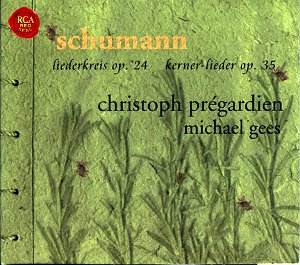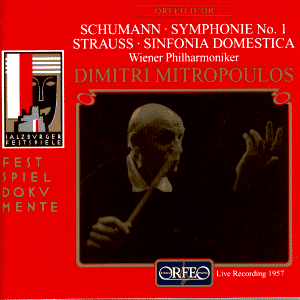 Review of Christoph Prégardien and Michael Gees: Schumann Liederkreis and Kerner-lieder
Review of Christoph Prégardien and Michael Gees: Schumann Liederkreis and Kerner-lieder
Composer: Robert Schumann (1810-1856)
Works: Liederkreis, Op. 24 (Heinrich Heine); Kerner-lieder, Op. 35 (Justinus Kerner)
Performers: Christoph Prégardien, tenor; Michael Gees, piano
Recording: RCA Red Seal 74321 73235 2
Release Date: November 2001
Duration: 73:58
In this splendid recording of Robert Schumann’s Liederkreis and Kerner-lieder, tenor Christoph Prégardien and pianist Michael Gees delve into the emotional depths of the German lied, illuminating the exquisite interplay between text and music. Schumann’s Liederkreis, composed in 1840, marks a pivotal moment in the development of the song cycle, serving as a testament to the composer’s burgeoning lyrical style and his deep engagement with the poetry of Heinrich Heine. This collection is not only a showcase of Schumann’s melodic ingenuity but also a reflection of the Romantic era’s profound fixation on the interplay of love and nature.
Prégardien’s voice resonates with a clarity and warmth that aligns beautifully with Schumann’s intricate vocal lines. Notably, in “Ich wandelte unter den Bäumen,” he conveys a sense of introspective longing, his voice weaving through the gentle piano accompaniment with a palpable tenderness. Gees’ playing here is noteworthy; he employs a delicate touch that complements the vocal line without overshadowing it, allowing the lyricism of the music to emerge organically. Their musical rapport is evident throughout the recording, as they navigate the subtle dynamic shifts inherent in Schumann’s writing.
In contrast, Prégardien’s interpretation of “Wanderlied” reveals a more vigorous and martial energy, where his voice asserts itself with a commanding presence. The dynamic contrast between the agitated piano figures and the lyrical melody underscores the duality of the text, evoking the restless spirit of the wanderer. This performance choice effectively highlights the tension embedded in the song, a hallmark of Schumann’s ability to fuse emotional narrative with musical form.
The recording then transitions seamlessly into the Kerner-lieder, a collection that further exemplifies Schumann’s mastery in setting poetry to music. Here, Heine’s and Kerner’s texts delve into themes of love, loss, and existential contemplation. Prégardien’s vocal delivery in “Stille Liebe” is particularly poignant; he engages with the text’s somber reflection on love’s quiet suffering. His nuanced phrasing and the soft, almost fragile quality of his voice create an intimate atmosphere that draws the listener into the emotional core of the song.
In terms of vocal technique, Prégardien exhibits an impressive control over his instrument, although there are moments—such as in the higher tessitura of “Morgens steh ich auf und frage”—where a slight weakening occurs. This imperfection, rather than detracting from the performance, lends a human touch to the interpretation, reinforcing the vulnerability expressed in the text. It is a reminder that even the most skilled singers are not immune to the emotional weight of the music they perform.
Comparatively, this recording stands up well against other notable interpretations, such as those by Dietrich Fischer-Dieskau and Gerald Moore, known for their lush vocalism and interpretative depth. While Fischer-Dieskau offers a more dramatic reading, Prégardien’s approach is marked by subtlety and a nuanced understanding of Schumann’s lyrical intentions, making this recording a valuable addition to the canon of Schumann lieder.
The engineering of the recording is commendable; the balance between voice and piano is well-executed, allowing both elements to shine without unnecessary interference. The acoustic space provides an intimate setting that enhances the emotional resonance of the performances, fostering a sense of connection between the artists and the listener.
In conclusion, this recording of Schumann’s Liederkreis and Kerner-lieder by Christoph Prégardien and Michael Gees is a profound exploration of the complexities of the human experience as articulated through song. Their interpretations are marked by a deep understanding of the text, an appreciation for Schumann’s melodic lines, and a clear affinity between voice and piano. For aficionados of German lieder and those seeking to engage with the rich tapestry of Schumann’s musical language, this collection merits careful listening and reflection.



